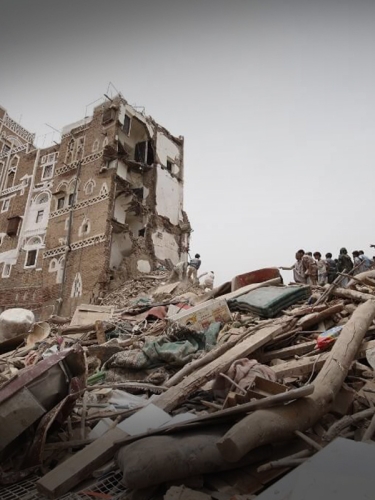New Report From Leading Yemeni NGO, International Human Rights Experts Details Ongoing Abuses, Failure to Provide Domestic Accountability or Support International Measures
Sana’a and New York City (July 18, 2023)
Saudi Arabia has failed to provide accountability for grave human rights abuses and apparent war crimes it has committed over more than eight years of armed conflict in Yemen, as well as remedies or reparations for those harmed, said Mwatana for Human Rights and the Columbia Law School Smith Family Human Rights Clinic today in a new report submitted to the United Nations Human Rights Council. The report will inform the Council’s upcoming review of Saudi Arabia’s human rights record.
“The international community must use Saudi Arabia’s Universal Periodic Review (UPR) process to champion accountability for serious abuses linked to its conduct in Yemen, particularly in the absence of other credible independent international mechanisms,” said Radhya al-Mutawakel, chairperson of Mwatana. “Saudi Arabia has not only failed to deliver accountability through either its national courts or the military coalition it launched, but it has actively worked to thwart international efforts to pursue accountability for abuses in Yemen.”
The report, authored by experienced human rights investigators and advocates from Mwatana and the Clinic, as well as a student advocate in the Clinic, sets forth a continued pattern of violations over the last four years, including airstrikes that killed civilians and destroyed civilian objects with no apparent military target nearby, denial of humanitarian aid, the use of starvation as a weapon of war, widespread detention-related abuses, and attacks on migrants. These findings are based on the results of detailed investigations conducted in Yemen over the four year reporting period, and more broadly over the course of Saudi involvement in Yemen war.
It further describes how Saudi Arabia has failed to ensure accountability for grave human rights abuses and apparent war crimes either through domestic prosecutions, or through an investigative body created by the Saudi and Emirati-led military coalition, tasked with investigating reported war crimes in Yemen. Saudi Arabia has also actively worked to thwart accountability through independent international mechanisms, most notably the UN-mandated Group of Eminent Experts that was disbanded in October 2021, after the Human Rights Council failed to renew its mandate. Saudi Arabia both failed to provide adequate information and cooperate with that body’s investigations, and campaigned against the renewal of its mandate through the Council. Finally, it finds that Saudi Arabia has failed to provide remedies or reparations for those harmed by violations of their rights.
“Saudi Arabia has pursued the goal of impunity for its actions in Yemen, despite years of credible reporting on war crimes and other serious abuses for which the authorities are responsible,” said Priyanka Motaparthy, director of the Project on Armed Conflict, Counterterrorism, and Human Rights at Columbia Law School’s Human Rights Institute. “States should use the UPR process to press for answers on what—if any—steps the government has taken, and press for new commitments to hold individuals responsible for well-documented human rights and international law violations.”
In March 2015, an international military coalition led by Saudi Arabia intervened in Yemen’s internal conflict by launching air strikes against the armed group Ansar Allah (the Houthis). The UN Group of Eminent Experts, before its disbandment, described a “pandemic of impunity” over the course of the conflict, and documented widespread violations of international law, including possible war crimes, by all parties to the conflict. While the conflict de-escalated following a UN-brokered truce in April 2022, warring parties, including Saudi Arabia, have continued to carry out rights abuses.
The fourth cycle of Saudi Arabia’s Universal Periodic Review will take place during the 45th Session of the Human Rights Council from January to February 2024.
The joint submission is available here.

